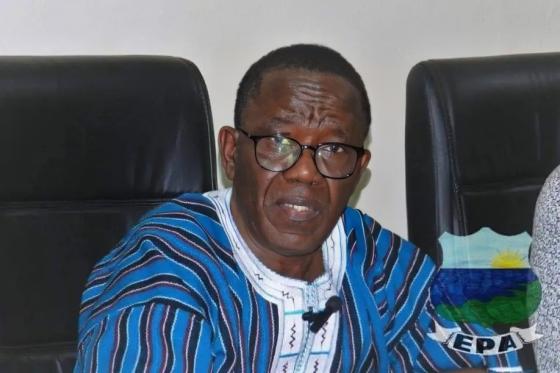Liberia: Wetlands Under Severe Threat

EPA’s Executive Director Wilson Tarpeh,
— As Liberia violates RAMSAR Convention
The increasing wave of destruction of the wetlands across the country is placing the country under the spotlight as it relates to the adherence or upholding of the Ramsar convention, according to the Environmental Protection Agency.
The EPA -- the government agency charged with the responsibility to protect and manage the environment, said at a press conference in Monrovia on Tuesday that the destruction of the wetlands is now at an alarming rate -- threatening the risk of flood damage, nutrient runoff, water pollution, as well as triggered a decline in wildlife populations.
“The increasing wave of destruction of our wetlands, especially in Monrovia and its environs, is not good for us. This is a clear violation of an international convention that we signed up to and this is not good for us as a country,” Wilson Tarpeh, EPA’s Executive Director said.
“These actions on the part of our people to destroy the wetlands continue to undermine the integrity of this fragile ecosystem of importance. As you may know, Liberia is a contracting party to the Ramsar Convention on Wetlands,” he said. “Therefore eyeing stringent measures to serve as a deterrent to those involved in those unwholesome acts.”
Liberia became a party to the Ramsar Convention on November 2, 2003. As a signatory to the Convention, which is an international treaty for the conservation and use of wetlands, Liberia is under obligation to protect and sustainably manage wetlands, especially those declared as Ramsar Sites of International significance.
In Liberia, the wetlands of international significance are Marshall in Margibi County, Mesurado in Montserrado County, Gbedin in Nimba County, Lake Piso in Grand Cape Mount County, and Kpatawee in Bong County.
Wetlands in Liberia and around the world play an important role in the processes that keep landscapes healthy and productive. They maintain water quality, provide habitat for commercial species, and have cultural and recreational values. Wetlands host a huge variety of life, protect our coastlines and provide natural defenses against river flooding or storm surges and store carbon dioxide to regulate climate change.
The wetlands that are being destroyed play a crucial role in the ecosystem by Preventing flooding by absorbing water; ensuring that the soil provides a unique breeding ground for vegetation that feed fish; giving shelter to animals; and purifying water by removing sediments.
But these wetlands, are now threatened by human induced activities such as construction, contrary to Sections 74 & 75 of the Environmental Protection and Management Law of Liberia, which EPA used to set specific guidelines or standards for the management of rivers, lakes, wetlands, and parts of the marine and coastal environments of significance.
Part of the guidelines frowns on construction in wetlands as it destroys the habitat of the area.
The EPA noted that the actions of those violators are having severe consequences on the environment such as pollution of wells giving rise to vector-borne diseases.
“The EPA is about to move in a strong way to put an end to the continuous encroachment on wetlands. Our people need to know that their actions are harmful to the environment. We heard how wildlife such as snakes and crocodiles were entering some dwelling places threatening the lives of our people during the heavy rainfall,” Tarpeh said.
“I want to strongly advise our people to stop destroying the wetlands.”
He also advised local administrators against the issuance of squatters’ rights within the wetlands that house the mangrove forests.
“The mangroves are there to prevent our homes from being flooded; Do not build dwelling homes in the swamp and; Do not dump waste in the wetlands,” Tarpeh warned. “We also want to advise our people to stop all those harmful practices that continue to degrade our wetlands, thereby compromising their health and livelihood.”
For the last several years, Tarpeh said the EPA has embarked on several actions to protect our wetlands including the development of the National Wetlands Policy, increased awareness about the importance of the wetlands, and demolition of illegal structures at strategic locations.
“Presently, we have our technicians in Monrovia and its environs carrying on awareness about the importance of protecting the wetlands and also collecting flood data,” the EPA disclosed.
